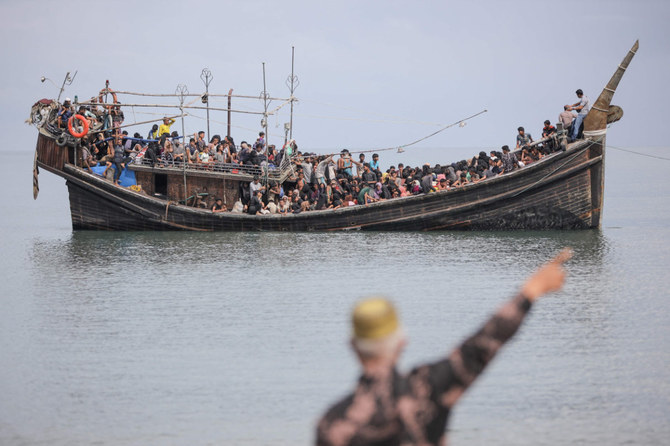JAKARTA: Arriving on a rickety boat in western Indonesia from squalid Bangladesh camps after weeks at sea late last year, hundreds of Rohingya refugees came to shore only to be turned around and pushed back.
The persecuted Myanmar minority were previously welcomed in the ultra-conservative Aceh province, with many locals sympathetic because of their own long history of war. But a wave of more than 1,500 refugees in recent months has been treated differently.
A spate of online misinformation in the world’s most populous Muslim-majority nation has stoked what experts say is rising anti-Rohingya sentiment culminating in pushback, hate speech and attacks.
In December, hundreds of university students entered a government function hall in Banda Aceh city hosting 137 Rohingya, chanting, kicking refugees’ belongings and demanding they be deported. The refugees were relocated.
“The attack is not an isolated act but the result of a coordinated online campaign of misinformation, disinformation and hate speech,” the United Nations Refugee Agency (UNHCR) said.
On social media, anti-Rohingya videos have been spreading since late last year, racking up more than 90 million views on TikTok alone in November, according to Hokky Situngkir, TikTok analyst at Bandung Fe Institute.
It began after some local media outlets reported the Rohingya’s arrival with sensational headlines, said Situngkir.
The reports have framed the mostly Muslim Rohingya as criminals with bad attitudes and Indonesian community leaders have reinforced this narrative.
Some TikTok users have reshared the sensational articles and videos, which would help generate more views and money.
“Sometimes when the sensation is too big, it turns out to be misinformation,” Situngkir told AFP.
Victims of human traffickers
President Joko Widodo has called for action against human traffickers responsible for smuggling Rohingya and said “temporary humanitarian assistance will be provided” to refugees while prioritizing local communities.
But a few days after the attack on a refugee shelter, the Indonesian navy pushed away a Rohingya boat approaching the Aceh coast.
Jakarta — not a signatory of the UN refugee convention — has appealed to neighboring countries to do more to take in the Rohingya.
On TikTok, dozens of fake UNHCR accounts have flooded Rohingya videos with comments.
“If you don’t want to help, just give them one empty island so they can live there,” one read, presented as if it was written by a real UNHCR account.
A post sharing a report that Indonesia’s Vice President Ma’ruf Amin was considering moving the refugees to an island was viewed three million times.
A verified account wrote underneath: “Big no! It is better to expel them, no use in sheltering them.”
Ismail Fahmi, analyst for social media monitor Drone Emprit, told AFP the narrative “seems coordinated” but presented as if “it was organic.”
The campaign started with posts from anonymous confession accounts, and then several users with large followings replied with anti-Rohingya messages, making the narrative appear to be trending, he said.
Locals say social media is making such anti-Rohingya sentiment appear widespread, but that was not reflected across Aceh day-to-day.
“It seems massive when we observe it on social media,” said Aceh fishermen community secretary-general Azwir Nazar, acknowledging that Rohingya defenders online were treated as a “common enemy.”
But, he said, “In reality, in our daily lives, things seem normal.”
Stoking anti-Rohingya feelings
Some of the most viewed videos peddling misinformation showed overcrowded vessels claiming to be ships carrying Rohingya to Indonesia.
The footage, viewed millions of times on TikTok, actually showed ferry passengers on domestic Bangladesh routes, according to an AFP Fact Check investigation.
Another video claimed Rohingya damaged an East Java refugee center — more than 2,300 kilometers (1,429 miles) from Aceh.
An AFP Fact Check investigation debunked the claim through interviews with authorities who said the perpetrators were not Rohingya.
The videos were uploaded on TikTok and video platform Snack, then reposted on other social media sites like Facebook and by local media outlets with millions of followers, boosting the misinformation’s reach, AFP’s Fact Check team found.
AFP, along with more than 100 fact-checking organizations, is paid by TikTok and Facebook parent Meta to verify videos that potentially contain false information.
Both organizations declined AFP requests for comment.
Some videos and comments were also related to this month’s presidential election.
Some mocked candidate Anies Baswedan, saying he supports the Rohingya because he recommended they be housed “in a separate place” to avoid conflict.
Others praised front-runner and Defense Minister Prabowo Subianto who has said Indonesia should “prioritize our people.”
But in several presidential debates so far, the candidates have not mentioned Rohingya migration.
For some in Aceh, anti-Rohingya feelings have stemmed from frustration at a lack of a government solution.
But the inflated anti-refugee posts have left them wondering if that feeling is genuine.
“Only Allah knows whether (the posts are) all humans,” said Nazar.
“Or perhaps, with the technology now, there might be AI or robots involved.”
























